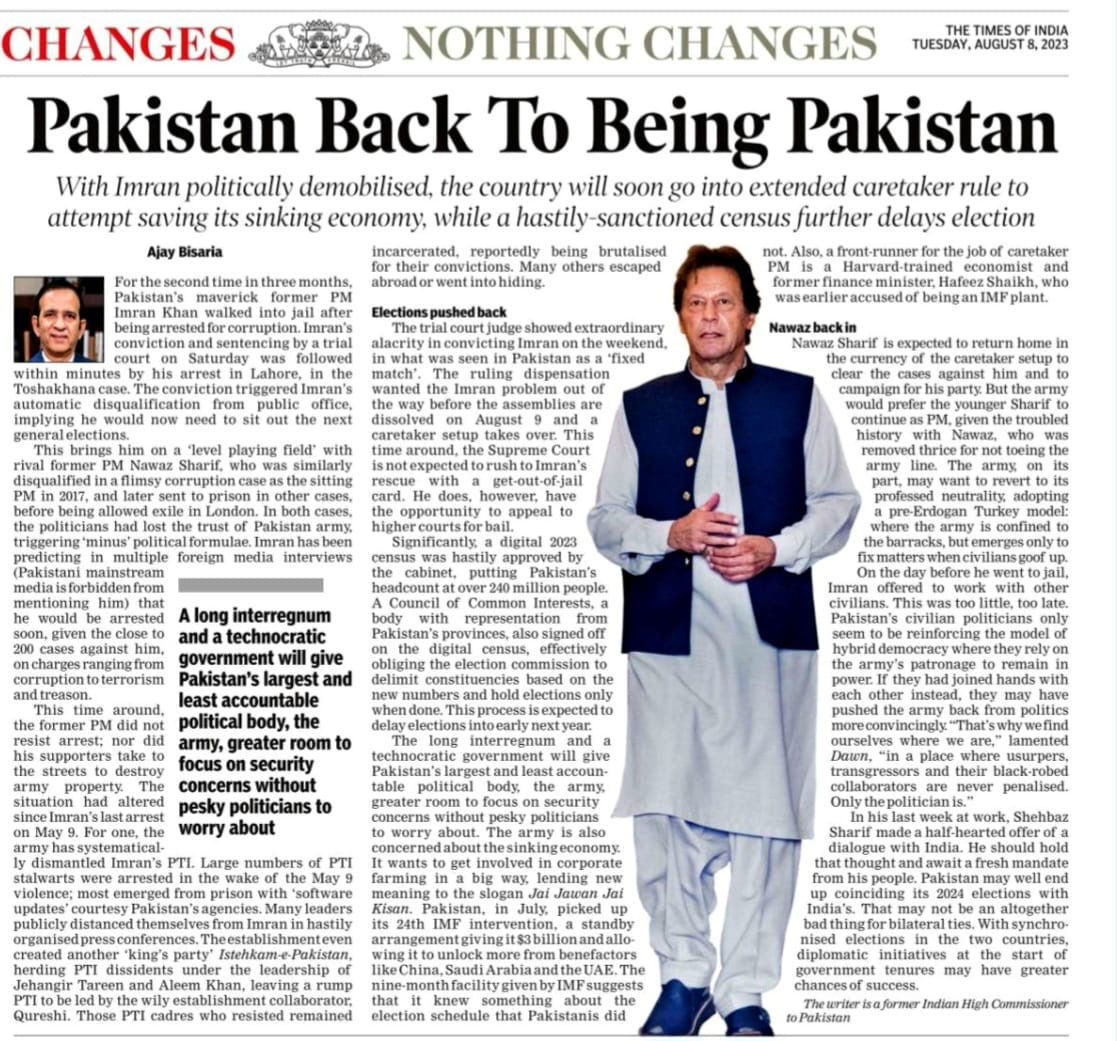Pakistan back to being Pakistan
With Imran politically demobilised, the country will soon go into extended caretaker rule to attempt saving its sinking economy, while a hastily-sanctioned census further delays election
For the second time in three months, Pakistan’s maverick former Prime Minister Imran Khan walked into jail after being arrested for corruption. Imran’s conviction and sentencing by a trial court on August 5 was followed within minutes by his arrest in Lahore, in the Toshakhana case. The conviction triggered Imran’s automatic disqualification from public offce, implying he would now need to sit out the next general elections.
This brings him on a ‘level playing field’ with rival former PM Nawaz Sharif, who was similarly disqualified in a flimsy corruption case as the sitting PM in 2017, and later sent to prison in other cases, before being allowed exile in London. In both cases, the politicians had lost the trust of the Pakistan army, triggering ‘minus’ political formulae. Imran has been predicting in multiple foreign media interviews (Pakistani mainstream media is forbidden from mentioning him) that he would be arrested soon, given the close to 200 cases against him, on charges ranging from corruption to terrorism and treason.
This time around, the former PM did not resist arrest; nor did his supporters take to the streets to destroy army property. The situation had altered since Imran’s last arrest on May 9. For one, the army has systematically dismantled Imran’s Pakistan Tehreek-e-lnsaf (PTI). Large numbers Of PTI stalwarts were arrested in the wake of the May 9 violence; most emerged from prison with ‘software updates’ courtesy Pakistan’s agencies. Many leaders publicly distanced themselves from Imran in hastily organised press conferences. The establishment even created another ‘king’s party’ Istehkam-e-Pakistan, herding PTI dissidents under the leadership of Jehangir Tareen and Aleem Khan, leaving a rump PTI to be led by the wily establishment collaborator, Shah Mahmood Qureshi. Those PTI cadres who resisted remained incarcerated, reportedly being brutalised for their convictions. Many others escaped abroad or went into hiding.
Elections pushed back
The trial court judge showed extraordinary alacrity in convicting Imran on the weekend, in what was seen in Pakistan as a ‘fixed match’. The ruling dispensation wanted the Imran problem out of the way before the assemblies are dissolved on August 9 and a caretaker setup takes over. This time around, the Supreme Court is not expected to rush to Imran’s rescue with a get-out-of-jail card. He does, however, have the opportunity to appeal to higher courts for bail. Significantly, a digital 2023 census was hastily approved by the cabinet, putting Pakistan’s headcount at over 240mn people. A Council of Common Interests, a body with representation from Pakistan’s provinces, also signed off on the digital census, effectively obliging the commission to delimit constituencies based on the new numbers and hold elections only when done. This process is expected to delay elections into early next year.
The long interregnum and a technoc”atic’government will give Pakistan’s largest and least accountable political body, the army, greater room to focus on security concerns without pesky politicians to worry about. The army is also concerned about the sinking economy. It wants to get involved in corporate farming in a big way, lending new meaning to the slogan Jai Jawan Jai Kisan. Pakistan had in July
picked up its 24th International Monetary Fund (IMF) intervention, a standby arrangement giving it $3bn and allowing it to unlock more from benefactors like China, Saudi Arabia and the UAE. The nine-month facility given by the IMF suggests that it knew something about the election schedule that Pakistanis did not. Also, a front-runner for the job of caretaker PM is a Harvard-trained economist and former finance minister, Hafeez Shaikh, who had been accused earlier of being an IMF plant.
Nawaz back in
Nawaz Sharif is expected to return home in the currency of the caretaker setup to clear the cases against himself and to campaign for his party. But the army would prefer the younger Sharif to continue as PM, given the troubled history with Nawaz, who was removed thrice for not toeing the army line. The army, on its part, may want to revert to its professed neutrality, adopting a pre-Erdogan Turkey model: where the army is confined to the barracks, but emerges only to fix matters when civilians goof up. On the day before he went to jail, Imran offered to work with other civilians. This was too little, too late. Pakistan’s civilian politicians only seem to be reinforcing the model of hybrid democracy where they rely on the army’s patronage to remain in power. If they had joined hands with each other instead, they may have pushed the army back from politics more convincingly. “That’s why we find ourselves where we are,” lamented Dawn, “in a place where usurpers, transgressors and their black-robed collaborators are never penalised. Only the politician is.”
In his last week at work, Shehbaz Sharif made a half-hearted offer of a dialogue with India. He should hold that thought and await a fresh mandate from his people. Pakistan may well end up coinciding its 2024 elections with India’s. That may not be an altogether bad thing for bilateral ties. With synchronised elections in the two countries, diplomatic initiatives at the start of government tenures may have greater chances of success.
An edited version was first published in Times of India on August 8, 2023
